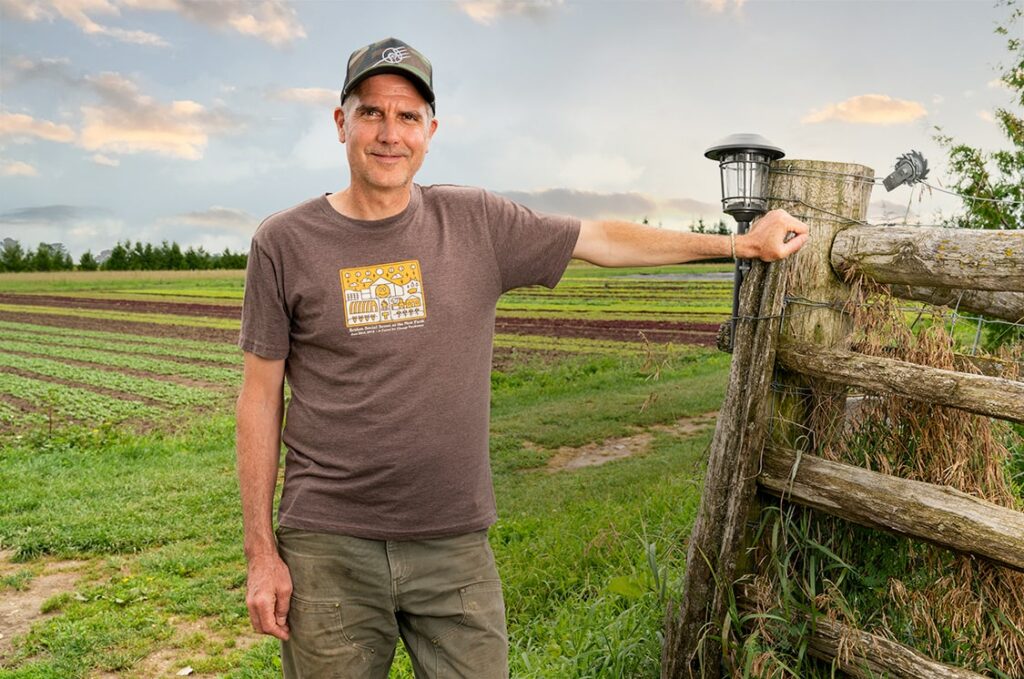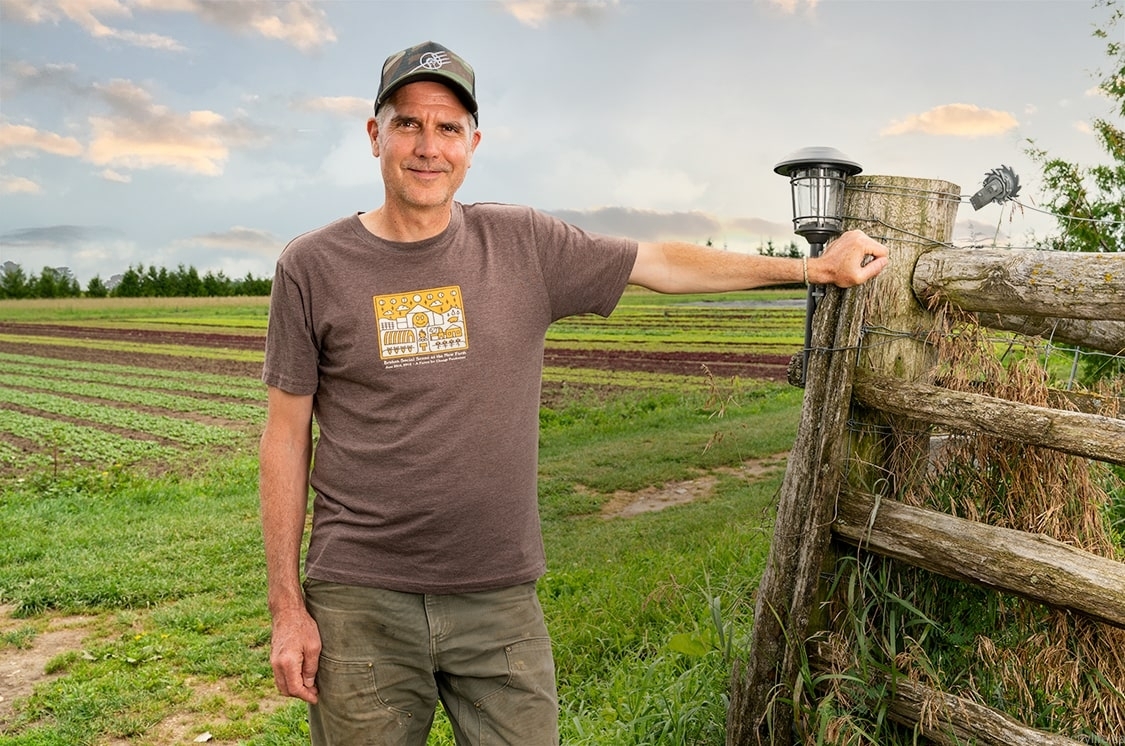Brent Preston: Grow Something Good

That’s the aim of Farmers for Climate Solutions, a national coalition of farmers and farmer-supporting organizations who believe that agriculture must be part of the solution to climate change. Climate-friendly farming is not only good for the planet, it’s good for people, too.
There’s no denying it. Across Canada, there’s a growing realization: climate change is a severe threat to the entire agricultural industry. “More and more farmers are realizing that we need to adapt aggressively to the changing climate,” says Brent Preston, the director of Farmers for Climate Solutions.
It’s no surprise that Preston is one of the leaders of the coalition. Originally from Toronto, he and his wife, Gillian, bought the New Farm, on the Niagara Escarpment near the village of Creemore, almost 20 years ago, growing vegetables sustainably and growing connections among farmers, chefs and low-income urban communities, too. But more about that later.
Back to the farmers and the coalition: everyone knows there’s strength in numbers. “We make change by working together and fighting for the change we want,” says Preston. “So, Farmers for Climate Solutions has given us an opportunity to take the lessons we’ve learned on our farm and try to use those to promote more substantial political change across the country.”
In Canada, funding for farming is negotiated between provinces, territories and federal governments with five-year Agricultural Policy Frameworks (APFs). With the next one beginning in 2023, the coalition assembled a task force of experts in late 2021, including university researchers and organizations like Ducks Unlimited, to identify the most cost-effective ways to reduce emissions rapidly. They came up with ideas for nitrogen management, manure handling, livestock and soil management, tree management and programs to protect wetlands, putting forth an ambitious report, Rooted in Climate Action, to reduce emissions and strengthen resilience on farms across Canada.
“More and more farmers are realizing that we need to adapt aggressively to the changing climate”
Just this past July, the APF for 2023- 28, called the Sustainable Canadian Agricultural Partnership, was approved. “Ministers in earlier meetings had agreed that climate change was a priority, and we have good policies coming out of the agreement, but it definitely didn’t go as far as we would have liked,” says Preston. Take CO2 emissions, for instance. The Coalition looked at opportunities for emission reduction and came up with about 16 million tonnes of CO2 equivalent that could be cut from the agricultural system. The agreement calls for three to five million tonnes of emission reductions. “It’s good because it’s the first time they [the government] have ever agreed to a target for emission reduction, but it falls short … as they’re only calling for a third of what we think could be achieved if we were more ambitious,” he adds.
It’s not easy. The crux of the problem is that these measures can be costly for farmers to adopt. So, Preston focuses on the advantages for all Canadians. “We all benefit when we produce less greenhouse gases and when our agricultural system is more resilient,” he says. How to deal with farmers who aren’t on board? Essentially, Preston tries to just get them moving in the right direction, “because the climate crisis in farming means we don’t have time to mess around — we have got to get moving.”
One thing Preston is glad about is that people are now talking openly about farmers’ mental health. “I’ve struggled with depression, mostly because I focus too much on work, and too much time spent toiling away alone,” he says. He’s not alone. Canada’s farming system has evolved over the past 50 years to make it more common that one person runs a big operation, limiting day-to-day contact with others. Add things like the weather and financial stress, and you can see how it happens. “I’m hopeful that more people are talking about it, and I’m also happy that we’ve been able to find a model on our farm in which we’re better able to take care of ourselves,” he says. That includes pursuing other farm-related passions, but not necessarily working on the farm every day.
In fact, at the New Farm it’s been a bit of a roller-coaster since the pandemic. Since most of their sales were to restaurants, they lost that business and started selling their produce to grocery stores. Now they’ve pivoted again, sending most of their produce to food banks and to good-food organizations. “We’ve done that by raising money from some amazing companies and individuals who basically buy our food so we can send it to food banks and people who can’t afford to buy it,” he says. That’s a big deal for Preston. “For our family, we think about food as a basic human right — so that’s amazing!”
Right from the start, Preston has been an advocate of organic sustainable farming and, in fact, he chronicled his family’s experiences and laid out a model for a new kind of agriculture in a book called (what else?) The New Farm. Recently, a production company has purchased the film rights, and there are plans for a TV series. You might think all this might go to one’s head. But Preston has his feet planted firmly on the ground, and he leads by example. One lesson he wants to pass on to his kids is that no matter what career path you take in life, you can always be doing good. “Whatever you’re passionate about, you can find a way to do it that makes things better for other people,” he says.
farmersforclimatesolutions.ca
thenewfarm.ca
@thenewfarm
INTERVIEW BY ESTELLE ZENTIL
















































































